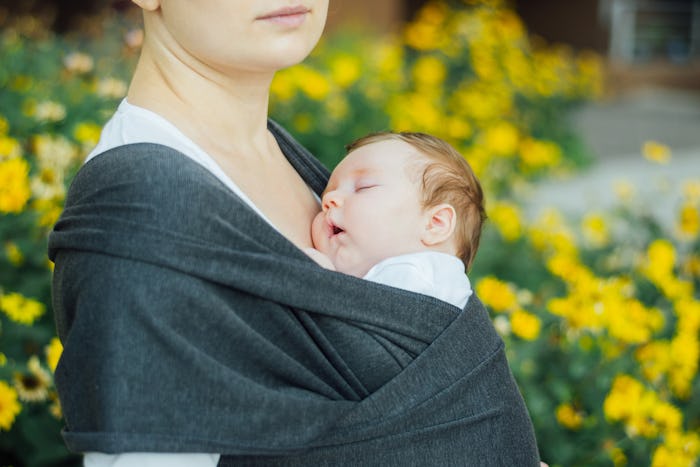Life

If The Carrier Is Your Baby's Favorite Way To Nap, Science Has An Explanation
One of the best naps I've ever had to this day was in a hammock in the Bahamas. Between the warmth and the gentle rocking, I was out — I woke up with weird indents all over my body and had no regrets. Where else can you find such optimal napping conditions? Your baby knows: they get all of that warm, rocking goodness every time they're strapped to you in their baby carrier. If you're wondering why your baby always falls asleep in the carrier — even when they won't fall asleep anywhere else — there are plenty of reasons why.
Baby carriers and baby slings are incredibly popular, and for good reason. Wearing your baby is a lot easier than carrying them, as it frees up your arms and takes up a lot less space than a stroller. The physical closeness strengthens the bond between parent and child, and you can get a nice whiff of baby smell whenever you desire. What a perk! But why does your baby always fall asleep the second they get settled into their carrier? And why does it seem like that's the only place they'll sleep? There are several factors that play into their carrier snooze.
After being carried around inside of you for nine months, being separated from mama can be quite scary and uncomfortable for a new baby. During the period known to some as the "fourth trimester," your child feels safest and most relaxed when close to you — for example, while in a baby carrier on your chest. Wearing your baby in a carrier mimics the closeness you two had during pregnancy, and this comfort helps the baby drift off to sleep.
Of course, it's not just being in a carrier that makes a baby fall asleep. Your child is much more likely to conk out while you're moving around, and there are scientific reasons for that. According to a study done by researchers Kumi Kuroda, Gianluca Esposito, and Sachine Yoshida, "the heart rates of babies greatly slow down immediately after they are picked up and carried." Per an article about the study in Psychology Today, "This study is the first to show that the infant calming response to carrying is a coordinated set of central, motor, and cardiac regulations that is an evolutionarily preserved aspect of mother-infant interactions, the researchers say." When your entire body is suddenly relaxed, what is more natural than falling asleep?
Many parents think they're creating a bad habit by using their baby carrier to get their baby to fall asleep. But the parenting website Ask Dr. Sears argues that, in fact, letting your baby nap in the carrier is not only emotionally beneficial, but physically beneficial. According to the website, "Babywearing exerts a regulatory effect on the baby, primarily through the vestibular system.... Activities such as rocking and carrying stimulate the baby’s vestibular system. Vestibular stimulation is a recently appreciated tool for helping babies breath and grow better, especially premature infants — those at highest risk of SIDS." Your own heartbeat, breathing, and movement can help your baby regulate theirs, and reduce the risk of a tragedy.
Of course, benefits are negated if babywearing isn't done safely and appropriately. When your baby is in the carrier, make sure their head and neck are supported at all times and their face is clear, according to Today's Parent. Make sure their face is visible, their chin is not tucked, and their air intake is not limited whatsoever.
It's easy to get frustrated or impatient if every time you try to put your child down in their crib, screaming ensues. It can be helpful to understand that your child isn't simply becoming spoiled by being in a carrier on your chest — there are real, physiological effects that contribute to their desire to be close to you.